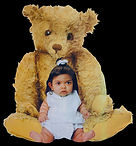SMALL
MIRACLES

Scotch Plains – Theodora Loeffler’'s nurse picks a raisin from a jar and places it on the edge of a toy box. Theodora scoots forward, lifts herself by the box’s edge and takes a few lunging steps on unsteady legs. She reaches her goal, plucking the raisin off the box and pressing it into her mouth.
“You have no idea how much work went into that. You have no idea what a miracle that is,” her mother, Vanessa Loeffler, said.

Theodora 7, took her first steps last week. After years of uninterrupted medical attention punctuated by lifesaving emergency surgeries, Theodora slowly is beginning to explore her world.
For her mother, Theodora’s first steps are a sign of her recovery from a protracted period of her recovery from a protracted period of life-threatening complications. They renew her faith that Theodora will lead a wholly self-sufficient and independent life. Theodora is one of 50,000 children in the United States stricken with some form of dwarfism.
“The doctors say they can’t say for sure what she will do,” Loeffler said. “I will tell you: She’s going to do everything. She’s going to walk and she’s going to talk.”
Most dwarves lead relatively normal lives, but Theodora’s case is different: Acute deformation of her skeleton makes unassisted breathing impossible.
She is one of three children nationwide afflicted by a form of severe skeletal dysplasia. She spends 22 hours each day attached to life-support systems. Nurses watch over Theodora for 16 hours each day to ensure she’s breathing properly, suctioning fluids from her lungs. Loeffler watches her for the other eight.
Caring for Theodora is a full-time job for Loeffler, a single parent who has three other children. For the first year and a half of Theodora’s life, life-threatening episodes occurred every few months. With the assistance of some of the world’s leading medical experts at Johns Hopkins University Medical Center, Theodora survived, and her condition has stabilized.
Despite the sacrifices she’s had to make, Loeffler said she’s never regretted her decision to fight for Theodora. She said medical personnel and others have counseled her countless times to institutionalize Theodora.
“It was never an option. It was never something I could seriously consider – giving up on my own child,” she said.
Her daughter’s struggle has tested all of her family’s resources. As Loeffler battled with agencies and bureaucrats, she developed the desire to increase resources and extend them to others in similar situations.
So she started the Teddy Bear Foundation in 1994. The foundation’s mission is to raise funds to benefit children stricken by severe achondroplasia, a rare and related form of dwarfism that comes with life-threatening complications. The foundation, still in its early stages of fund raising, intends to help children get the care they need and to support research.
The foundation will hold its third annual fund-raising event October 6 at the Plainfield Country Club. Participants are asked to contribute $500 for a day’s golf outing, lunch, cocktails and dinner, or $125 just for dinner.
Loeffler said the foundation plans to help a 5-year-old boy suffering from severe dwarfism in Florida whose parents are unable to pay for needed surgery.
“This foundation is going to grow. I am serious about it, and I am going to put all of my energy into it. It’s going to grow and it’s going to make a difference,” Loeffler said.
She chafes at the suggestion she is heroic.
“I wonder sometimes, what else do they expect me to do? I don’t think of it as admirable. It’s a natural thing to do. She’s my child, and I’m going to do what’s best for her,” she said.
Loeffler acknowledges the overwhelming support she’s received, attributing her daughter’s success to the doctors, nurses, rescue workers and teachers who have helped her.
“The doctors said that if we kept fighting, Theodora might have a chance to make it. That’s all we needed to hear,” she said.
